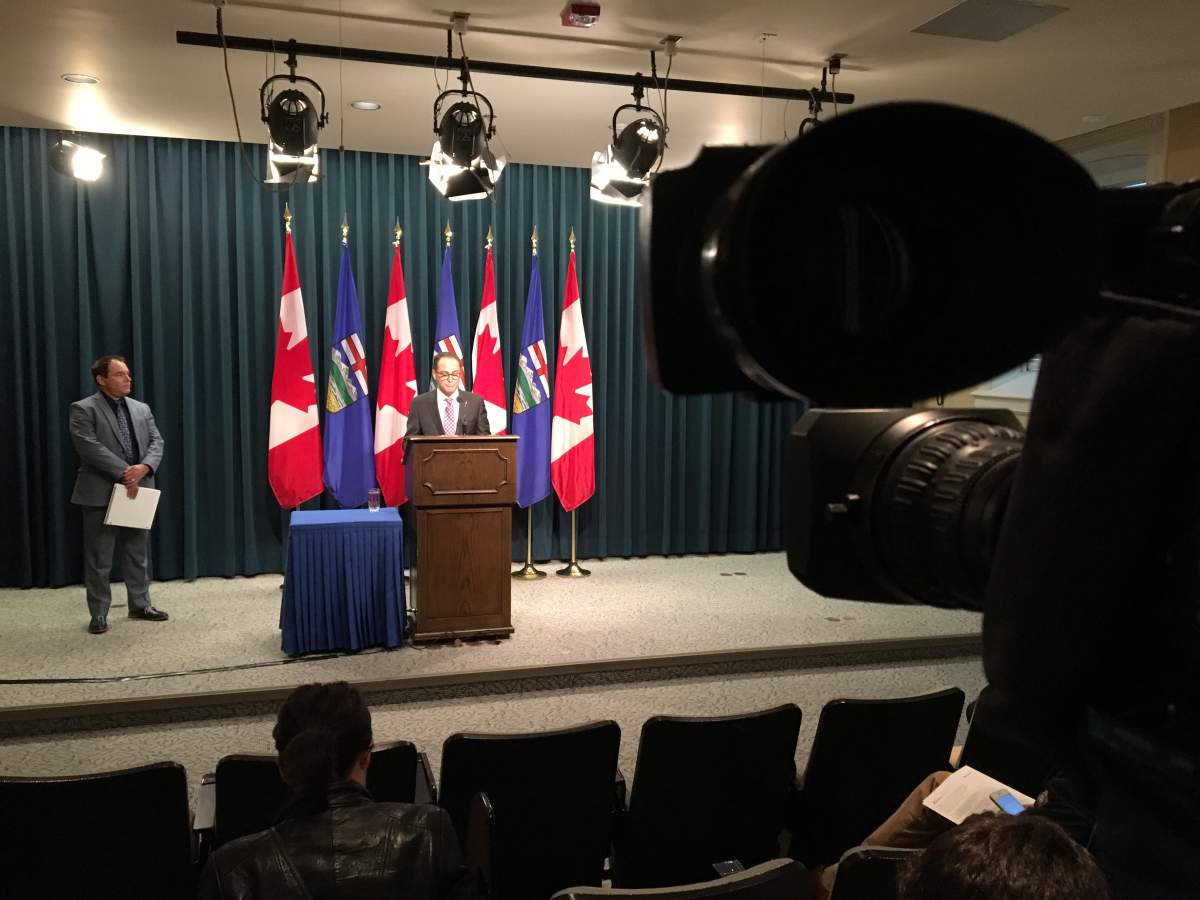The Alberta government says it will provide $11.2 million over two years to municipalities as part of a Municipal Cannabis Transition Program.

The grants will be distributed based on application submitted to the province, for communities incurring extra costs connected to cannabis legalization.
WATCH: The province has announced it is providing $11.2 million over two years to help some Alberta communities with the legalization of recreational marijuana. Kendra Slugoski provides the details.

READ MORE: Chief says policing legal pot in Edmonton will cost upwards of $7M
A base level of funding will be provided for all municipalities who pay for their own policing (populations must be over 5,000), with additional money being given to some communities based on costs outlined in their applications.
Sixty per cent of the funding will be given to applicants this year, while 40 per cent will be given next year.
Watch Below: Alberta Finance Minister Joe Ceci says the province had to consider the forecasted profits over several years before deciding how much funding it could supply to municipalities to help cover cannabis legalization-related costs.

READ MORE: Alberta will provide municipalities ‘up-front funding’ to help with cannabis legalization costs
The funding falls short of repeated demands from municipalities to provide ongoing funding or a cut of cannabis tax income.
Edmonton Mayor Don Iveson said he was furious with the lack of support from the province on this file.
“I’m sure, like most other mayors of larger communities in Alberta, we’re all disappointed. The province and the feds are going to make heaps of money off this over several years and we’re the ones who have real costs on the ground and we’ve been saying this for a year now.
“We need resolution on cannabis that’s better than this,” Iveson said.
He described the funding as inadequate and unacceptable, especially when Edmonton police chief Rod Knecht has said his extra policing costs will be roughly double what the city will get. Iveson can only anticipate what Edmonton might see because final figures aren’t disclosed city by city. He thinks Edmonton will get a little over $2 million over two years.
READ MORE: Cost of cannabis: How will Edmonton pay for enforcement?
“I’ve said that I don’t want to raise property taxes to deal with the cost of legalization here,” Iveson said.
“Quite possibly where this could wind up is that police have about a $4-million ask in for cannabis. If we get a million and change from the province, I’ll hand that through to the police and they can hire as many officers as they can.
“And if we’re having enforcement challenges, that’s going to be on the province.”

Get weekly money news
Iveson said the funding shortfall also means there will be no money to handle the extra work that licensing and bylaw staff will be taking on.
READ MORE: Edmonton mayor wants share of pot revenue to cover extra police costs
“I think the police chief — who have been great on this — need to make the case to our public, who in turn can speak to their MLAs, and say: ‘Local government should not be left on the hook on this.’ It’s simply not fair and waiting two years to find out… that we’re tens of millions of dollars short, or many positions short in terms of enforcement, is not how we wanted this to go.
“We’ve been gentle about this all the way along but now that we know that our real concerns have not been taken seriously, I’m furious.”
He also criticized the province’s timing.
“We’ve been waiting a long time for this. To announce it two days before legalization seems very last minute,” said Nenshi.
Watch below: With a hard date now in place for marijuana legalization, there are questions about how police will deal with people who get high and drive. Vinesh Pratap takes a look at what tools they have now, and the questions they’re still asking.

The province has a 16.8 per cent excise tax in place on all wholesale cannabis products. That works out to about .75 cents per gram for to province and . 25 cents per gram for the federal government.
“This is short-term funding because we know that there are real-world impacts to cannabis legalization,” Finance Minister Joe Ceci said.
“But we’re going to continue to consult with our municipal partners as we move forward.
“I don’t anticipate this being a profit centre for government of Alberta for a couple of years. We’re cognizant of that when we’re dealing with the amount of money we’re talking about.”
READ MORE: Legal marijuana could see justice costs climb, not drop, Alberta premier says
“Our cities and towns are the front lines when dealing with many aspects of cannabis legalization,” said Minister of Municipal Affairs Shaye Anderson.
“This funding will help offset some of the costs they’re facing.
“I look forward to continue working with local leaders to understand the real-world effects of legalization.”
Rural municipalities are concerned about the lack of supports available to them. The Rural Municipalities of Alberta (RMA) has advocated that all municipalities receive a 50 per cent share of federal cannabis excise tax revenues that are distributed from Ottawa to the provincial government.
LISTEN: Joe Ceci joins Rob Breakenridge to discuss the province’s preparedness for pot
The RMA is worried because the province’s Municipal Cannabis Transition Program only provides “minimal funding to a limited number of Alberta’s municipalities.”
“The recent announcement provides some support to some larger urban centres; however, rural areas rely on RCMP to monitor and handle criminal activity, not develop and enforce municipal bylaws,” RMA President Al Kemmere said.
“The lack of funding through the Municipal Cannabis Transition Program made available to Alberta’s rural and small urban municipalities raises significant concerns as to the effective enforcement of bylaws guiding recreational cannabis use.”
MAP: 17 Alberta shops will sell cannabis on 1st day of legalization
The Alberta Gaming, Liquor and Cannabis Commission said it is very confident the supply available at retail locations and online can meet demand on Oct. 17 and going forward.
It is also optimistic that all the retail locations granted interim licences will be ready to go for legalization day.

The AGLC expects another 250 locations will open within one year.
“We take our role as the regulator of liquor and gaming seriously,” Alain Maisonneuve, AGLC’s president & CEO, said. “The safety of all Albertans is at the forefront of our work as we provide oversight to these industries, and that remains our focus as we add legal cannabis to our portfolio.”
The AGLC has signed agreements with 15 licensed producers — three of which are in Alberta — to supply cannabis products to the AGLC which will then provide it to retailers.
“I’m happy to report that almost 1,000 individuals are certified as qualified cannabis workers and are able to work in licensed retail cannabis store in Alberta,” Maisonneuve said.
“As more retail locations open, we expect to see more individuals becoming qualified.”
The province is also reminding Albertans that albertacannabis.org is the only legal alternative to Albertans looking to avoid what’s anticipated to be long lines at retail locations.
The AGLC said it’s working with law enforcement to crack down on the black market.
READ MORE: Online pot shopping will require double ID check in Alberta
“We have been testing our shipping processes with our partners in shipping — Canada Post and Purolator — with great success.
“Albertans can trust that they will receive orders quickly and discretely and that their orders will not end up in the hands of youth and children,” Maisonneuve said.
You are only legally allowed to carry up to 30 grams of cannabis, according to federal law. Single purchases online will be limited to 30 grams but there will not be limits on in-store purchases.
The province said it will be up to local police to determine what quantity would be considered possession for the purpose of trafficking if found inside a home or elsewhere.
The age of those buying cannabis online will be verified according to a credit file database.
If the buyer doesn’t have an established credit card, they will be given a bar code to take to a Canada Post location to verify the person’s age.
- WestJet execs tried cramped seats on flight weeks before viral video sparked backlash
- Pizza wars? As U.S. chains fight for consumers, how things slice up here
- Health Canada says fake Viagra, Cialis likely sold in multiple Ontario cities
- Canada increased imports from the U.S. in October, StatCan says













Comments